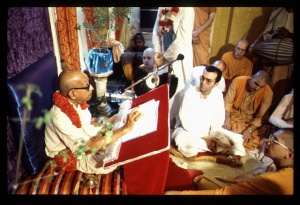SB 6.15.17: Difference between revisions
m (1 revision(s)) |
(Vanibot #0054 edit - transform synonyms into clickable links, which search similar occurrences) |
||
| (One intermediate revision by one other user not shown) | |||
| Line 1: | Line 1: | ||
{{info | {{info | ||
|speaker= | |speaker=Aṅgirā Muni | ||
|listener=King Citraketu | |listener=King Citraketu | ||
}} | }} | ||
[[Category:Srimad-Bhagavatam - Canto 06 Chapter 15]] | |||
[[Category:Bhagavatam Verses Spoken by Angira Muni - Vanisource|061517]] | |||
<div style="float:left">'''[[Srimad-Bhagavatam]] - [[SB 6|Sixth Canto]] - [[SB 6.15: The Saints Narada and Angira Instruct King Citraketu|Chapter 15: The Saints Nārada and Ańgirā Instruct King Citraketu]]'''</div> | |||
<div style="float:right">[[File:Go-previous.png|link=SB 6.15.16]] '''[[SB 6.15.16]] - [[SB 6.15.18-19]]''' [[File:Go-next.png|link=SB 6.15.18-19]]</div> | |||
{{RandomImage}} | |||
==== TEXT 17 ==== | ==== TEXT 17 ==== | ||
<div class="verse"> | |||
<div | :śrī-aṅgirā uvāca | ||
śrī-aṅgirā uvāca | :ahaṁ te putra-kāmasya | ||
ahaṁ te putra-kāmasya | :putrado 'smy aṅgirā nṛpa | ||
putrado 'smy aṅgirā nṛpa | :eṣa brahma-sutaḥ sākṣān | ||
eṣa brahma-sutaḥ sākṣān | :nārado bhagavān ṛṣiḥ | ||
nārado bhagavān ṛṣiḥ | |||
</div> | </div> | ||
| Line 18: | Line 23: | ||
==== SYNONYMS ==== | ==== SYNONYMS ==== | ||
<div class="synonyms"> | |||
<div | ''[//vanipedia.org/wiki/Special:VaniSearch?s=śrī&tab=syno_o&ds=1 śrī]-[//vanipedia.org/wiki/Special:VaniSearch?s=aṅgirāḥ&tab=syno_o&ds=1 aṅgirāḥ] [//vanipedia.org/wiki/Special:VaniSearch?s=uvāca&tab=syno_o&ds=1 uvāca]'' — the great sage Aṅgirā said; ''[//vanipedia.org/wiki/Special:VaniSearch?s=aham&tab=syno_o&ds=1 aham]'' — I; ''[//vanipedia.org/wiki/Special:VaniSearch?s=te&tab=syno_o&ds=1 te]'' — of you; ''[//vanipedia.org/wiki/Special:VaniSearch?s=putra&tab=syno_o&ds=1 putra]-[//vanipedia.org/wiki/Special:VaniSearch?s=kāmasya&tab=syno_o&ds=1 kāmasya]'' — desiring to have a son; ''[//vanipedia.org/wiki/Special:VaniSearch?s=putra&tab=syno_o&ds=1 putra]-[//vanipedia.org/wiki/Special:VaniSearch?s=daḥ&tab=syno_o&ds=1 daḥ]'' — the giver of the son; ''[//vanipedia.org/wiki/Special:VaniSearch?s=asmi&tab=syno_o&ds=1 asmi]'' — am; ''[//vanipedia.org/wiki/Special:VaniSearch?s=aṅgirāḥ&tab=syno_o&ds=1 aṅgirāḥ]'' — Aṅgirā Ṛṣi; ''[//vanipedia.org/wiki/Special:VaniSearch?s=nṛpa&tab=syno_o&ds=1 nṛpa]'' — O King; ''[//vanipedia.org/wiki/Special:VaniSearch?s=eṣaḥ&tab=syno_o&ds=1 eṣaḥ]'' — this; ''[//vanipedia.org/wiki/Special:VaniSearch?s=brahma&tab=syno_o&ds=1 brahma]-[//vanipedia.org/wiki/Special:VaniSearch?s=sutaḥ&tab=syno_o&ds=1 sutaḥ]'' — the son of Lord Brahmā; ''[//vanipedia.org/wiki/Special:VaniSearch?s=sākṣāt&tab=syno_o&ds=1 sākṣāt]'' — directly; ''[//vanipedia.org/wiki/Special:VaniSearch?s=nāradaḥ&tab=syno_o&ds=1 nāradaḥ]'' — Nārada Muni; ''[//vanipedia.org/wiki/Special:VaniSearch?s=bhagavān&tab=syno_o&ds=1 bhagavān]'' — the most powerful; ''[//vanipedia.org/wiki/Special:VaniSearch?s=ṛṣiḥ&tab=syno_o&ds=1 ṛṣiḥ]'' — sage. | ||
śrī-aṅgirāḥ | |||
</div> | </div> | ||
| Line 26: | Line 30: | ||
==== TRANSLATION ==== | ==== TRANSLATION ==== | ||
<div class="translation"> | |||
<div | |||
Aṅgirā said: My dear King, when you desired to have a son, I approached you. Indeed, I am the same Aṅgirā Ṛṣi who gave you this son. As for this ṛṣi, he is the great sage Nārada, the direct son of Lord Brahmā | Aṅgirā said: My dear King, when you desired to have a son, I approached you. Indeed, I am the same Aṅgirā Ṛṣi who gave you this son. As for this ṛṣi, he is the great sage Nārada, the direct son of Lord Brahmā | ||
</div> | </div> | ||
__NOTOC__ | |||
<div style="float:right; clear:both;">[[File:Go-previous.png|link=SB 6.15.16]] '''[[SB 6.15.16]] - [[SB 6.15.18-19]]''' [[File:Go-next.png|link=SB 6.15.18-19]]</div> | |||
__NOTOC__ | |||
__NOEDITSECTION__ | |||
Latest revision as of 22:30, 18 February 2024

His Divine Grace
A.C. Bhaktivedanta Swami Prabhupada
A.C. Bhaktivedanta Swami Prabhupada
TEXT 17
- śrī-aṅgirā uvāca
- ahaṁ te putra-kāmasya
- putrado 'smy aṅgirā nṛpa
- eṣa brahma-sutaḥ sākṣān
- nārado bhagavān ṛṣiḥ
SYNONYMS
śrī-aṅgirāḥ uvāca — the great sage Aṅgirā said; aham — I; te — of you; putra-kāmasya — desiring to have a son; putra-daḥ — the giver of the son; asmi — am; aṅgirāḥ — Aṅgirā Ṛṣi; nṛpa — O King; eṣaḥ — this; brahma-sutaḥ — the son of Lord Brahmā; sākṣāt — directly; nāradaḥ — Nārada Muni; bhagavān — the most powerful; ṛṣiḥ — sage.
TRANSLATION
Aṅgirā said: My dear King, when you desired to have a son, I approached you. Indeed, I am the same Aṅgirā Ṛṣi who gave you this son. As for this ṛṣi, he is the great sage Nārada, the direct son of Lord Brahmā